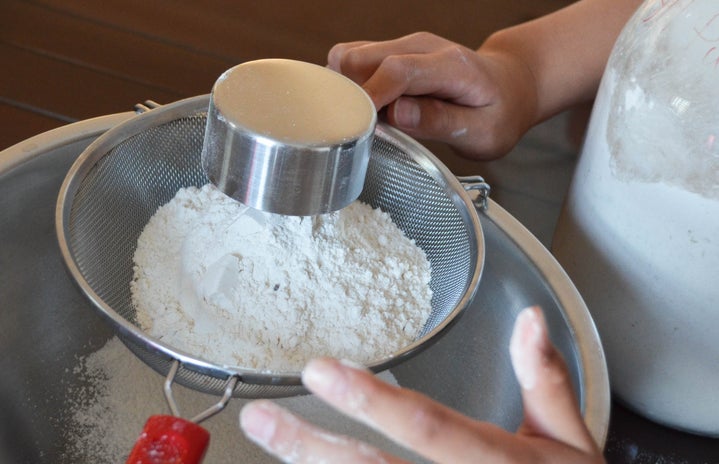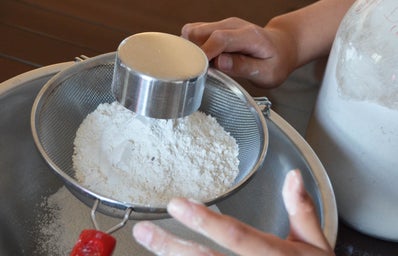Every morning I wake up, I make a tea and get ready for my day to repeat. Each morning consists of the drone of either the Prime Minister or Premier talking about the worsening COVID-19 situation in Canada. I then open my Instagram to see COVID-19 memes circulating and anti mask rallies being posted. When I open up my Facebook, I get mask advertisements in my suggested category, which is then followed by me opening up my snapchat and seeing government of Canada advertisements begging people to not go to parties.
Everywhere I turn there is new coronavirus stress weighing on me and turning even more of my hair grey — Keep in mind I am only 19 and half of my hair is grey already. And while I can’t seem to get much of a grip on the coronavirus situation it turns out that baking really is something that requires time and effort which gives me all the time in the world to either knead out my anxieties or distract myself from the constant flashing of news and numbers.
Now let’s talk about the beginning of quarantine when this pandemic first got serious in Canada. Yeast, flour, baking powder (and of course toilet paper??) were sold out. I could not get my hands on baking materials until my mother found a 10 Lb bag of whole wheat flour and active dry yeast. This was like gold to me. As I lugged this heavy bag of flour into the kitchen my mind went searching for what desserts to make and what breads to try. So, I embarked on my new culinary adventure, baking.
I started at first with understanding how much time baking really requires and let me tell you it takes TIME. Proofing a dough, to many might seem like a spelling mistake when you read it in instructions. But when they tell you to proof your dough, it means you let your creation sit in a warm area for an hour or sometimes longer to grow and for the yeast to activate. This is important because it changes your baked good from being flat and dense to being airy, buoyant and overall delicious.
After your dough is done its first proofing, you either shape it or knead it then you proof it again for another hour or so. Then you bake it, let it cool and then voila half of your day is gone and so is your COVID-19 anxiety!
My next step after understanding proofing became flavours. Cinnamon sugar seemed all too basic, I made cinnamon buns every other day in the beginning of lockdown. Then I discovered an old recipe of a Greek cultural bread Tsoureki which is a braided egg bread. This took hours and involved some braiding halfway through. I watched my bread change from being a boring hunk of dough, to a beautiful golden braid of bread with the smell wafting all up and around me. This too got boring after the fourth of fifth try. Then came my cheese crown bread. An endless swirl of fancy cheese, butter and some spices all brushed with honey. It was heaven, the bread didn’t last, not even a day in my house.
There are so many different things I experimented with, when I was feeling super bored or anxious about how school was going, or about the dangers of COVID for my 80 year old grandma, bread did the trick. 6 hours of watching and taking care and precision alleviated some of the pain that came with these worries. When my family craved chocolate there were so many cookies, muffins and homemade cakes I experimented with and made. In the summer when all the fresh Ontario fruit was abundant there came pies and gallates. Now that it’s fall I’ve been making scones and baked apple goods. Even though it is midterm season I can still put apart an hour of my day to destress and make something!
You may be thinking about how much weight I gained in the midst of all this from all these bakes I made, but most of these goods were gone by the time I went back into the kitchen. Eaten up by thieves (mainly my father)! While baking has given me a lot of things including a distraction from the difficulties of 2020 it mainly taught me patience and gave me an understanding that I cannot control everything.
Sometimes the dough didn’t rise well and came out chunky and dense, sometimes my flavours were off or it tasted bland. Sometimes I dropped half of it out of the pan and straight out of the floor. Sometimes I would realize I didn’t have an ingredient halfway through the recipe. I would run out of parchment paper and have my bread stick to the pan and be impossible to eat. Sometimes I forgot about the bread and left it in the oven for too long. Sometimes it burned sometimes it was too doughy, sometimes it was just plain gross. What I learned from all these silly mistakes that seemed uncontrollable is that I can try my hardest to pay attention to what I am making. I can measure everything to the teaspoon and still things don’t have to go the way I have planned. Just like 2020, when I had so many plans for my summer, for my birthday, for school, I felt like I had planned my year beautifully. When it all came crumbling down around me it shocked me, left me feeling disappointed and deceived. I was bored, angry and felt alone and to think that kneading dough would help me come to terms with a year lost sounds crazy. But it allowed me to realize that there are things in this world you can control and things you cannot and a global pandemic and whether or not my dough will rise is not one of them.



